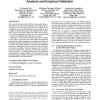Free Online Productivity Tools
i2Speak
i2Symbol
i2OCR
iTex2Img
iWeb2Print
iWeb2Shot
i2Type
iPdf2Split
iPdf2Merge
i2Bopomofo
i2Arabic
i2Style
i2Image
i2PDF
iLatex2Rtf
Sci2ools
GECCO
2008
Springer
2008
Springer
The impact of population size on code growth in GP: analysis and empirical validation
The crossover bias theory for bloat [18] is a recent result which predicts that bloat is caused by the sampling of short, unfit programs. This theory is clear and simple, but it has some weaknesses: (1) it implicitly assumes that the population is large enough to allow sampling of all relevant program sizes (although it does explain what to expect in the many practical cases where this is not true, e.g., because the population is small); (2) it does not explain what is meant by its assumption that short programs are unfit. In this paper we discuss these weaknesses and propose a refined version of the crossover bias theory that clarifies the relationship between bloat and finite populations, and explains what features of the fitness landscape cause bloat to occur. The theory, in particular, predicts that smaller populations will bloat more slowly than larger ones. Additionally, the theory predicts that bloat will only be observed in problems where short programs are less fit tha...
| Added | 09 Nov 2010 |
| Updated | 09 Nov 2010 |
| Type | Conference |
| Year | 2008 |
| Where | GECCO |
| Authors | Riccardo Poli, Nicholas Freitag McPhee, Leonardo Vanneschi |
Comments (0)

